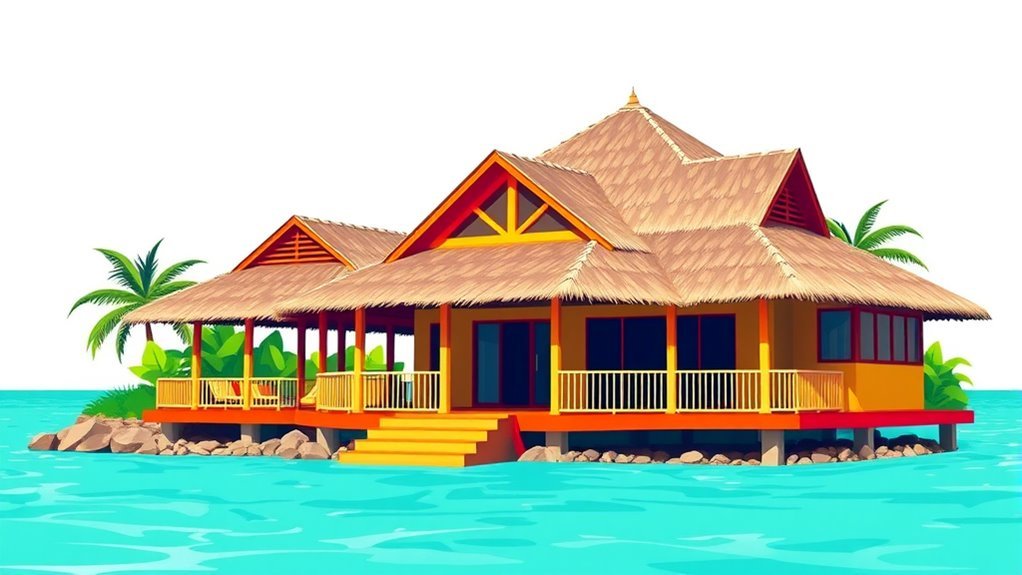Micronesia presents diverse opportunities for financial success. Utilize vast marine resources with sustainable fishing. Boost agricultural profitability through modern techniques. Tourism thrives with quality accommodations and service. Explore niche markets like renewable energy and waste management. Success requires understanding the local business environment. Build trust through personal connections. A localized approach to marketing is key. These insights are crucial for navigating the Micronesian market. Discover further information.
Main Points
- Capitalize on marine resources through sustainable fishing and aquaculture for income generation.
- Develop tourism and hospitality ventures, focusing on quality service and targeted marketing.
- Explore niche markets like renewable energy, waste management, and skilled trades.
- Understand the Micronesian business culture, emphasizing trust and localized approaches.
- Boost export revenues and enhance agricultural profitability to contribute to economic growth.
Capitalizing on Micronesia’s Natural Resources
Micronesia’s natural resources present various opportunities for economic development.
Its vast marine resources, including tuna and other fish stocks, support a potentially lucrative fishing industry. Sustainable fishing practices can ensure long-term resource availability while boosting export revenues.
Agriculture, particularly the cultivation of coconuts, breadfruit, and tropical fruits, offers avenues for local production and export. Investing in modern farming techniques and value-added processing can enhance agricultural productivity and profitability.
Additionally, Micronesia’s mineral deposits, such as phosphate, present possibilities for mining operations, provided environmental safeguards are in place. Thoughtful management of these resources can contribute to sustainable economic growth.
Thriving in Tourism and Hospitality

Tourism and hospitality represent a crucial sector for economic growth. Establishing accommodations, such as hotels, guesthouses, and eco-lodges, caters to diverse traveler preferences. Restaurants serving local flavors and international cuisine enhance the visitor experience. Tour operators can focus on organized sightseeing, diving excursions, and cultural immersion.
Success requires a commitment to quality service and understanding visitor needs. Training local staff ensures professional service delivery.
Maintaining facilities to international standards encourages positive reviews. Building relationships with travel agencies and online platforms is vital for attracting customers. Marketing efforts that showcase Micronesia’s beauty can increase tourist arrivals.
Niche Markets and Untapped Opportunities
Beyond the established tourism and hospitality sector exists specialized markets with considerable prospects. Focused agricultural ventures, like cultivating high-value crops such as organic produce or unique Micronesian spices, can find a ready market.
Opportunities lie in sustainable fishing and aquaculture that cater to both local consumption and export.
Renewable energy solutions, especially solar, are needed to address the energy challenges of the islands.
Waste management and recycling initiatives present an emerging area for entrepreneurial involvement.
Skilled trades, such as construction, plumbing, and electrical services, are in demand due to infrastructural development.
Navigating the Micronesian Business Landscape
Before launching a business, understanding the nuances of the Micronesian business environment is essential. This involves appreciating the cultural values of respect, community, and tradition, which significantly impact business relationships and practices. Building trust through personal connections is crucial for long-term success.
Bureaucracy can be complex. Patience and persistence are vital when dealing with permits, licenses, and regulations.
Forming strategic partnerships with local businesses or individuals can provide invaluable insights and guidance. Understanding land tenure laws is particularly important, as land ownership often involves intricate customary practices. A localized approach to marketing and operations is key.
Common Questions
Can Foreigners Easily Own Land in Micronesia?
Foreigners cannot typically own land in Micronesia. Land ownership is generally reserved for citizens. There may be potential long-term leases available depending on the specific state and applicable regulations. Navigating local laws and consulting with experts is crucial for foreign investors.
What Are the Best Micronesian Banks for Startups?
Micronesia’s best banks for startups are difficult to definitively name. Bank of Guam and Bank of FSM are possibilities. Assessing specific startup needs against each bank’s services is crucial. Availability and interest rates should be carefully researched for tailored solutions.
How Does the Cost of Living Compare?
Micronesia’s cost of living varies by island. Generally, imported goods are expensive due to shipping. Local produce is more affordable. Overall, living costs can be comparable to or slightly higher than some U.S. states, depending on lifestyle.
What Visas Are Needed for Foreign Workers?
To work in Micronesia, foreigners generally need an entry permit and a work permit. These are obtained through the FSM Department of Resources and Development. Requirements vary, often dependent on the specific job and the duration of stay.
Is Internet Reliable for Online Businesses?
Internet reliability for online businesses in Micronesia can be inconsistent. Connectivity varies across the islands, with urban centers generally offering more stable service than remote areas. Therefore, online business success depends on location.